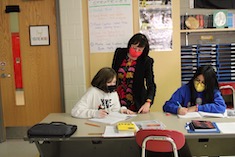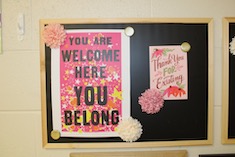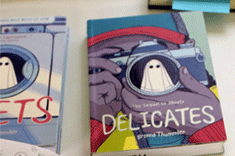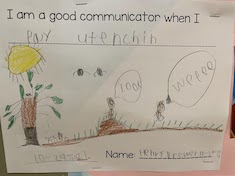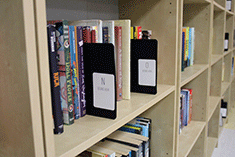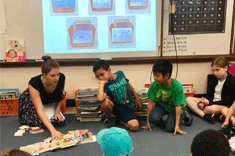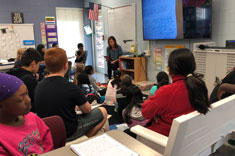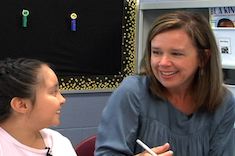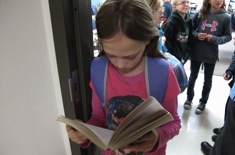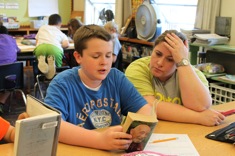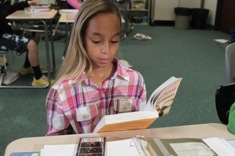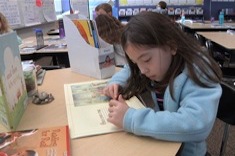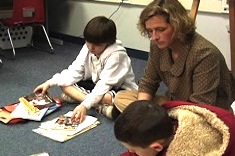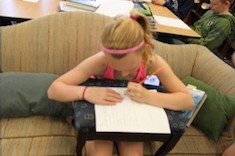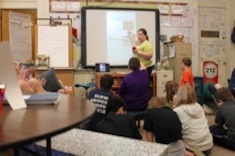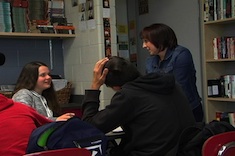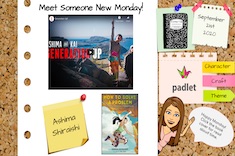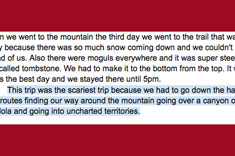5th
Latest Content
What Criteria Should We Use When Selecting Whole-Class Texts?
Christy Rush-Levine reminds us that text selection affects students. By shaping a unit of study to contain texts of varying formats and representing a wide variety of characters, students are empowered to develop their own ideas even while reading a whole-class text. Download a diverse text list to deepen a discussion of how family shapes identity.
Tips for Selecting Inclusive Texts
Hannah Tills and Josie Stewart challenge themselves to select more inclusive texts so all students feel as though they belong. They offer six suggestions to help us examine our bookshelves, thinking, and curriculum.
Book Talk: Sheets and Delicates by Brenna Thummler
Christy Rush-Levine pairs Brenna Thummler’s books Sheets and Delicates in a book talk for her sixth-grade class.
What Is Communication? A Mini-Inquiry Project and Booklist
Bitsy Parks leads her first-grade class in a study about communication to strengthen their socially distanced and muffled-by-masks community. Included is a booklist.
Quick Take: Simple Classroom Library Organization
Christy Rush-Levine shares her simple system for organizing her massive classroom library.
The Seasons of Classroom Libraries
Melissa Quimby shifts her classroom library throughout the year so that as her students grow as readers, her library will continue to nourish them.
Formative Assessment From Share Sessions
Ruth Ayres outlines different kinds of share sessions and different formats for the share, including some that take advantage of technology.
Write Like Nancy
Inspired by a stranger on a walk, Jen Court clarifies the importance of sharing our writing lives with others. She identifies three important qualities of a writing community.
Fifth-Grade Writing Conference: The Heart of the Story
Dana Murphy confers with fifth grader Rebecca about her writing draft, and they discuss the heart of her story.
The Classroom Library: Building Bridges
Cathy Mere presses to help children take the first steps in growing a sustainable reading life that carries beyond the classroom walls. She offers ways to build bridges to the school and public libraries as an essential step.
Conferring Over Whole-Class Reading
Deb Gaby confers with Riley about The Lemonade War. They talk about the writing about reading that students are doing for this whole-class read.
Finding Time for Read Aloud
Katherine Sokolowski makes a case for the importance of reading aloud to secondary students and offers suggestions to make it a reality. She includes a list of five surefire read aloud books for middle school students.
Ten Ways to Celebrate Writers
Jen Court gives 10 ways for students to share and celebrate their work as writers. Two downloads are included for you to use in your classroom.
Picture Books to Teach Conflict
Katherine Sokolowski shares a book list that inspires her to teach five different kinds of conflict.
Picture Books that Help Construct a Wider Definition of Home
Stella Villalba compiles a book list about the topic of home. She shares the way she allows students to co-construct their own understanding of home by using picture books that provide a variety of lenses through which to view the topic.
Quick Take: Share Your Reading Struggles
Instructional coach Staci Revere reminds us of the importance of modeling our own reading lives for students, especially the parts where we struggle as readers.
Four Keys to Making Workshop Work
Bitsy Parks reminds us of four key components of running a workshop and offers advice for making workshop work.
Bring In the School Year Like a Grandma
Julie Johnson reflects on how to help students know they belong and are valued in a classroom community.
One Instructional Strategy Changes a Reading Community: Status of the Class
Mandy Robek reminds us of the power of a status of the class to build a reading community.
A Roving Student Conferrer
Tammy Mulligan encourages students to support their peers as writers by being a “roving student conferrer.” When we enable students to take on the role of the teacher, it helps solidify what they know, as well as take pride in their writing skills.
Combining Personal Narratives and Comics
Katherine Sokolowski combines personal narratives and comics to encourage students to go deeper in their storytelling.
Teaching Students How to Email
Katherine Sokolowski outlines the nitty-gritty on how to teach students to organize, manage, and compose email.
Sensible Reasons to Use Student Reading Records
Leigh Anne Eck outlines sensible reasons for students to keep reading records. She considers guidance for book selection, data for teachers, and entry points for reading conferences.
Words of Wisdom and Passing the Torch
Melanie Quinn shares a fun activity to help current students share advice for next year’s class.
Tracking Thinking: Fifth-Grade Small Group
Julianne Houser meets with a small group of fifth graders to help them build skills for tracking thinking.
Importance of Talk in Writing Workshop
Julie Johnson reminds us of important mindsets to adopt to allow students the space and permission to talk while composing. When students talk as writers, they have opportunities to create new understandings, build relationships, and validate each other.
What Do Readers Need?
Christy Rush-Levine offers a close look into the needs of readers by considering engagement, enrichment, and nourishment. She offers three examples of reading conferences with students.
Online Routines to Create Energetic Reading Communities
Melissa Quimby shares online routines to strengthen the class reading community.
Troubleshooting Difficulties When Writing a Big Idea in Memoir
Kate Mills and Tara Barnett pinpoint common difficulties in sixth-grade memoir. They share teaching points and student writing samples before and after revision.
Assessing Students Online: Small and Powerful Moves
Tammy Mulligan shares small and mighty moves when assessing students online.
Browse Content By
Type
Category
- Assessment Tools
- Big Fresh Archives
- Booklists
- Choice Numeracy
- Classroom Design
- Common Core
- Community Building
- Conferring
- Content Literacy
- Digital Literacy
- English Language Learners
- Equity
- Family Relations
- Free Samples
- Guiding Groups
- Leadership
- Literacy Coaches
- Mentor Texts
- Minilessons
- New Teacher Mentors
- Podcasts
- Poetry
- Quote Collections
- Reading Strategies
- Self Care
- Struggling and Striving Learners
- Talking and Listening
- Teacher Study Groups
- Teaching Reading
- Teaching Writing
- Word Study and Vocabulary
Author
- Melissa Quimby
- Nawal Qarooni
- Gwen Blumberg
- Julie Cox
- The Lead Learners
- Hannah Tills
- Josie Stewart
- Ruth Metcalfe
- Mallory Messenger
- Becca Burk
- Jodie Bailey
- Vivian Chen
- Mary Brower
- Tiffany Abbott Fuller
- Stephanie Affinito
- Ruth Ayres
- Leigh Anne Eck
- Heather Fisher
- Shari Frost
- Julie Johnson
- Suzy Kaback
- Gigi McAllister
- Shirl McPhillips
- Melanie Meehan
- Cathy Mere
- Debbie Miller
- Tara Barnett and Kate Mills
- Tammy Mulligan
- Dana Murphy
- Bitsy Parks
- David Pittman
- Brenda Power
- Heather Rader
- Matt Renwick
- Mandy Robek
- Christy Rush-Levine
- Gretchen Schroeder
- Jen Schwanke
- Brian Sepe
- Katherine Sokolowski
- Stella Villalba
- Jennifer Vincent
Grade Level
Choice Literacy Membership
Articles
Get full access to all Choice Literacy article content
Videos
Get full access to all Choice Literacy video content
Courses
Access Choice Literacy course curriculum and training

